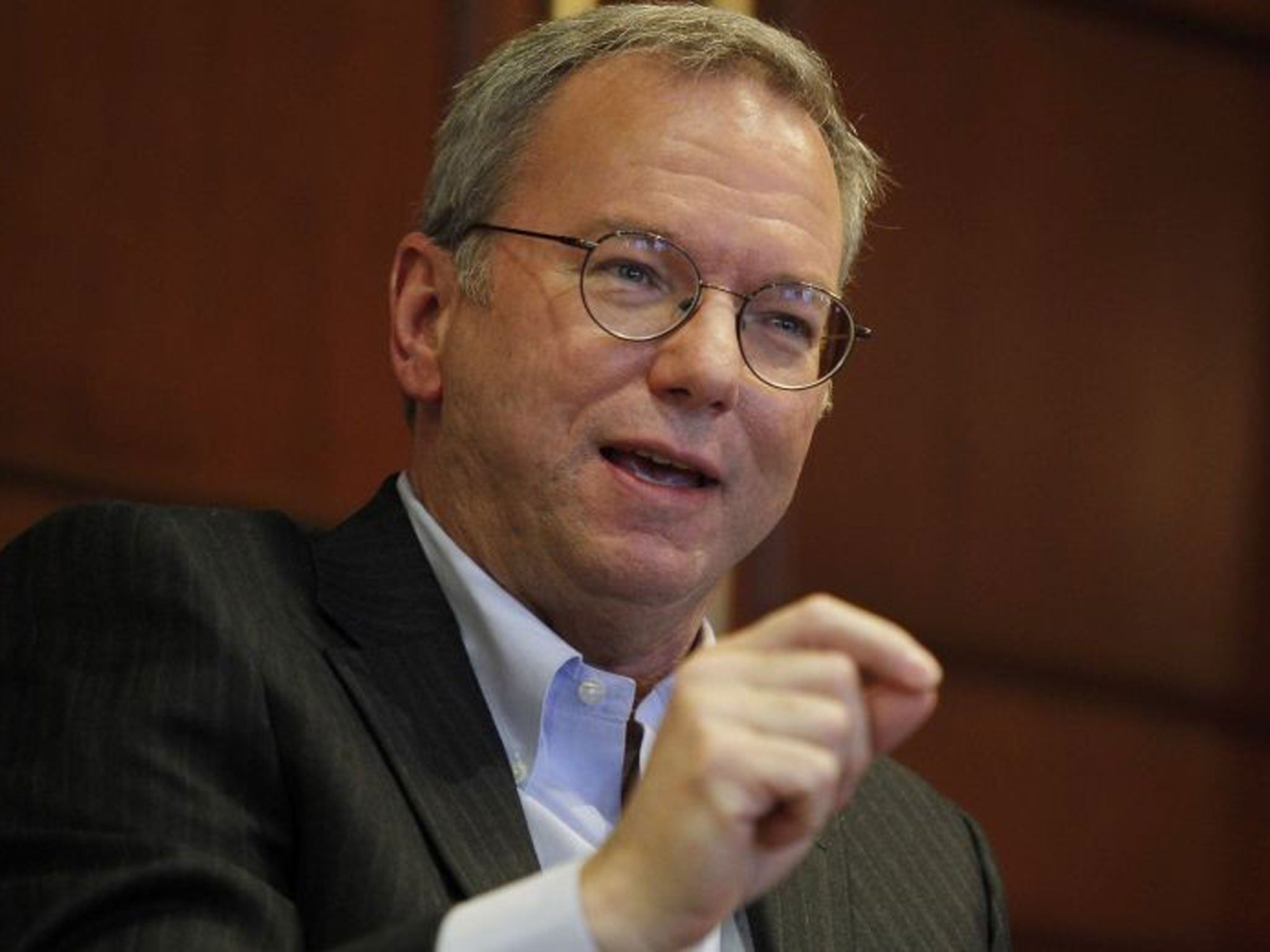Google boss Eric Schmidt hits back at Ed Miliband and vows to invest in UK even if it has to pay more tax
Labour leader had claimed US company was going to 'extraordinary lengths to avoid paying its taxes'

Your support helps us to tell the story
From reproductive rights to climate change to Big Tech, The Independent is on the ground when the story is developing. Whether it's investigating the financials of Elon Musk's pro-Trump PAC or producing our latest documentary, 'The A Word', which shines a light on the American women fighting for reproductive rights, we know how important it is to parse out the facts from the messaging.
At such a critical moment in US history, we need reporters on the ground. Your donation allows us to keep sending journalists to speak to both sides of the story.
The Independent is trusted by Americans across the entire political spectrum. And unlike many other quality news outlets, we choose not to lock Americans out of our reporting and analysis with paywalls. We believe quality journalism should be available to everyone, paid for by those who can afford it.
Your support makes all the difference.Google will continue to invest in UK even if the company is forced by law to pay more tax, the company's chairman Eric Schmidt said yesterday, claiming "we love you guys too much".
Responding to an attack by Ed Miliband, who claimed Google was going to "extraordinary lengths to avoid paying its taxes", Mr Schmidt said tax was a matter for Governments and not companies.
But he admitted that the current system "doesn't make sense" and said claimed Google fully backs the public debate on reform.
Speaking during a Q&A at the Google Big Tent event following Mr Miliband's speech at the same event which he did not attend, Mr Schmidt suggested that Google would never use its investment in the UK as a threat to avoid paying taxes.
"Google will continue to invest in the UK, no matter what you do, because the UK is too important to us," he said. "We love you guys too much."
He added: "All of us are operating in a very, very longstanding tax regime which was set up for various reasons that don't necessarily make sense to me or anyone else. But they are the way the global tax regime works."
He added: "I can't defend an irrational (tax) structure - a computer engineer would not have designed this."
Addressing Mr Miliband's assertion that Google was betraying its founding principle "not be evil" Mr Schmidt said: "We are trying to do the right thing. We are not trying to do the wrong thing.
"We completely endorse the idea of having a big debate at the G8, the G20 and so forth and so on. People have to sort this out."
But he added that international agreements should not see multinational companies "getting triple or quadruple-taxed".
It also emerged yesterday that Deputy Prime Minister Nick Clegg challenged Mr Schmidt about his company's tax bill when he attended the Prime Minister's Business Advisory Group in Number 10.
While David Cameron, who was also at the meeting, was careful not to single Google out Mr Clegg revealed he made clear to Mr Schmidt that at a time of austerity companies must "pay their fair share" and highlighted that Google was now learning how the public reacts to revelations of aggressive tax avoidance.
The criticism came after reports that Google paid only £10 million in corporation tax in the UK between 2006 and 2011, despite revenues of £11.9 billion.
The Deputy Prime Minister said: "My overall approach to tax is the obvious one. I put this directly to Eric Schmidt from Google and other business leaders at a meeting in Downing Street a couple of days ago.
"We are bringing the tax burden on corporations down by lowering the rate of corporation tax but in return people have to pay their fair share.
"What we can do and what we are doing, absolutely at the core of our G8 agenda, is to say we have got to ensure the rules apply more evenly across the piece so companies can't play cat and mouse with the tax system."
Aides said Mr Clegg was 'polite but firm' in the conversation.
In his speech to the Google big tent event Mr Miliband said: "In Google's 2004 IPO prospectus, it said: "Don't be evil. We will be stronger in the long term, we will be better served - as shareholders and in all other ways - by a company that does good things for the world, even if we forego some short-term gains. This is an important aspect of our culture and is broadly shared in the company".
"I can't be the only person here who feels disappointed that such a great company as Google, with such great founding principles, would be reduced to arguing that when it employs thousands of people in Britain, makes billions of pounds of revenue in Britain, it pays just a fraction of that in tax.
"So when Google does great things for the world, as it does, I applaud you but when Google goes to extraordinary lengths to avoid paying its taxes, I think it's wrong."
Join our commenting forum
Join thought-provoking conversations, follow other Independent readers and see their replies
Comments